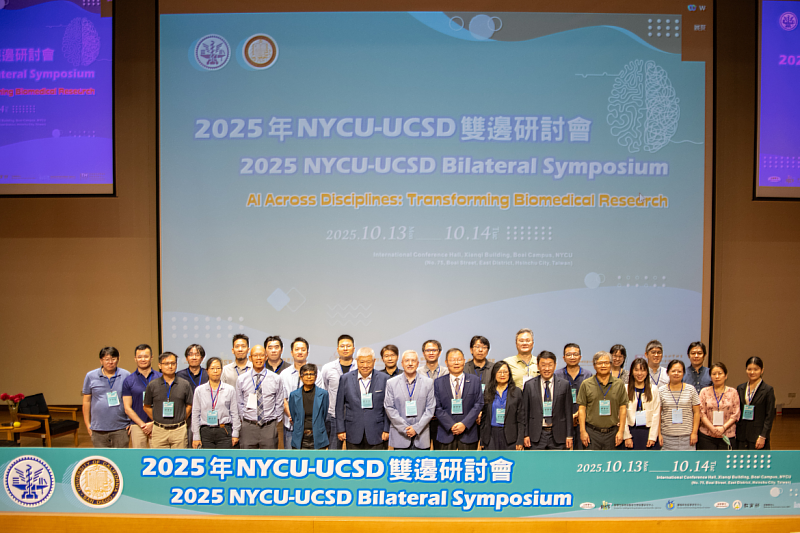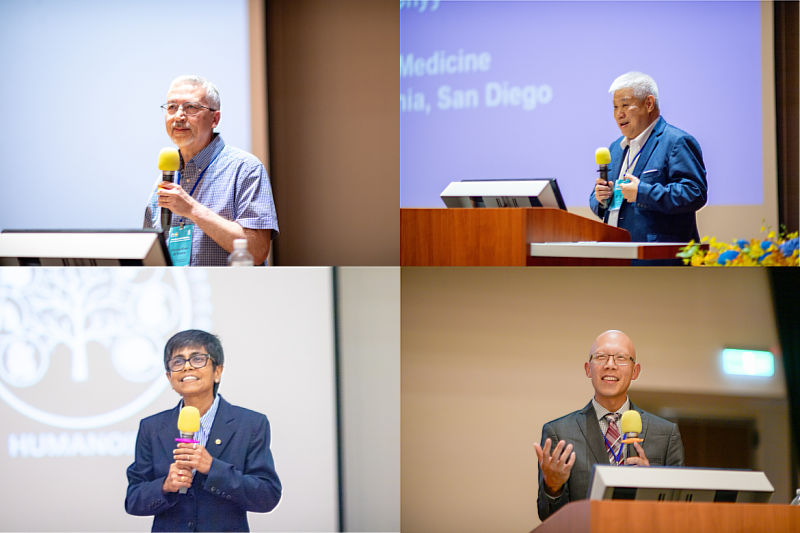NYCU and UC San Diego Renew Ties to Advance Interdisciplinary Research
(中央社訊息服務20251021 14:46:25)Co-hosted by NYCU’s Center for Intelligent Drug Systems and Smart Bio-devices and Cancer and Immunology Research Center, the 2025 NYCU–UCSD Bilateral Symposium was successfully held on October 13–14, 2025, at the International Conference Hall, Xianqi Building, Boai Campus. Centered on the theme “AI Across Disciplines: Transforming Biomedical Research” the two-day symposium brought together leading scholars from the University of California, San Diego (UCSD), who engaged with NYCU faculty and students through both in-person and online sessions.

The event attracted nearly 500 participants, reflecting strong interest in interdisciplinary biomedical innovation. A highlight of the symposium was the poster competition and exhibition, which drew 65 graduate students from across disciplines. The students showcased their research on cutting-edge topics such as AI-driven medical applications and biomedical image analysis, fostering vibrant discussion and academic exchange. Through these interactions, UCSD guests gained valuable insights into ongoing NYCU research and offered stimulating suggestions that may spark future international collaborations and innovative breakthroughs. The symposium opened with a keynote address by Academician Shu Chien, former Director of the Institute of Biomedical Engineering at UC San Diego and Member of Academia Sinica, whose remarks marked a symbolic and inspiring renewal of the long-standing academic partnership between the two universities. His words not only celebrated the resumption of collaboration after years of hiatus but also laid a strong foundation for deeper engagement and mutual advancement—signifying a new milestone in global cooperation between NYCU and UCSD.
The first NYCU–UCSD Bilateral Symposium was inaugurated in 2007, with both institutions alternating as hosts each year. This fruitful collaboration continued for 12 consecutive years until 2018, when it was interrupted by the COVID-19 pandemic and the subsequent merger of National Yang Ming University and National Chiao Tung University into NYCU. Now, in October 2025, the partnership has been fully revived—rekindling more than a decade of strong academic ties.
This year’s symposium focused on artificial intelligence, multi-omics, precision medicine, and drug discovery—fields that represent the forefront of biomedical research and innovation. These topics also embody the shared values that have guided both universities since the beginning of their collaboration: the integration of science and engineering and the pursuit of research that serves humanity. Beyond research outcomes, the partnership continues to strengthen the friendship, trust, and shared vision between NYCU and UCSD. Both institutions hope that this renewed collaboration will inspire substantial joint research projects and student exchanges, advancing the core mission of “integrating science and engineering for the betterment of human life.”
The 2025 symposium proudly hosted four distinguished UCSD scholars:
。Prof. Massimiliano Di Ventra, who presented on MemComputing, a novel physics-based computing paradigm that enhances machine learning performance through innovative computational mechanisms and neural network training strategies.
。Prof. John Y-J. Shyy, who shared insights into the regulatory roles of ACE2 (angiotensin-converting enzyme 2) in cardiovascular health and disease.
。Prof. Pradipta Ghosh, who introduced PICASSO (Phenotype-Informed Clinical Abstraction for Systematic Simulation and Outcomes)—a groundbreaking model redefining drug discovery and disease modeling through abstraction and mechanistic focus.
。Prof. Albert Hsiao, who discussed the translation of AI into clinical cardiovascular and thoracic imaging, demonstrating how AI technologies can transform diagnostic practice by addressing real-world clinical challenges.

The symposium concluded successfully, symbolizing not only the reconnection of academic friendship across the Pacific but also the beginning of a new chapter in interdisciplinary biomedical collaboration between NYCU and UCSD.





